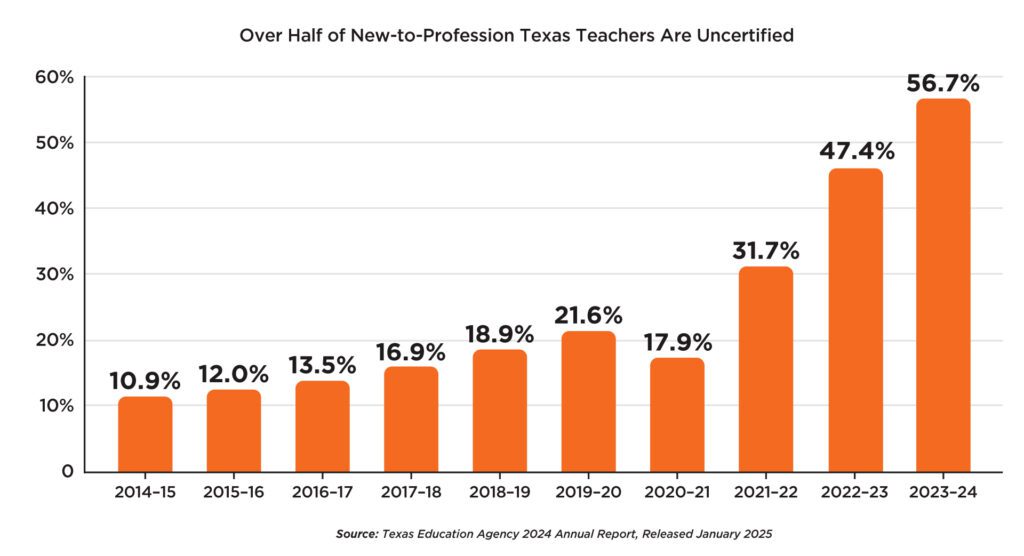Does certification translate to better student outcomes?
Yes. Students with new uncertified teachers lose about four months of learning in reading and three months in math unless the teacher has previous experience working in a public school. Students with uncertified new teachers are significantly underdiagnosed for dyslexia and are more absent from school.
Source: Amid Rising Number of Uncertified Teachers, Previous Classroom Experience Proves Vital in Texas J. Jacob Kirksey, Ph.D., Texas Tech University
Does certification matter for teacher retention?
Yes. Unlicensed new teachers quit teaching at much higher rates than licensed and qualified new teachers. Only 45% of unlicensed new teachers in rural communities stay in teaching beyond three years, while almost 80% of fully qualified new teachers continue in the profession.
Source: Unlicensed teachers now dominate new teacher hires in rural Texas schools, The Texas Observer
What do most uncertified teachers teach?
Uncertified teachers are found across subjects and grade levels. In the 2022-2023 school year, the largest percentage of uncertified teachers taught elementary (33%), early childhood (10%), Career and Technical Education (10%), Secondary Math (9%), Secondary English Language Arts (9%) and Special Education (8%).
Source: Amid Rising Number of Uncertified Teachers, Previous Classroom Experience Proves Vital in Texas J. Jacob Kirksey, Ph.D., Texas Tech University
How many uncertified teachers have been hired?
In the 2023-2024 school year, 56% of new to profession Texas teachers had no certificate and 38,257 of 352,303 total teachers (10.9%) were uncertified.
Source: Employed Teacher Attrition and New Hires 2014-15 through 2023-24, Texas Education Agency
How can school districts hire uncertified teachers?
Districts can hire uncertified teachers by applying for emergency permits and waivers, as well as including allowable exemptions within a District of Innovation (DOI) plan. There are 950 school districts that include an exemption for Educator Certification in their DOI plan.
Source: Districts of Innovation, Texas Education Agency
Do parents receive notification when an uncertified teacher is teaching their child?
It depends. There are 418 school districts whose District of Innovation (DOI) plans include an exemption for parental notification. Find your school district’s District of Innovation status on the Texas Education Agency website.
Does the type of certification matter?
There are different pathways and degrees of certification for teachers. In the 2023-24 school year, the most common pathways into teaching were uncertified (34%), reentry of teachers who had previously worked with any type of certification (31%), university-certified teachers (13%), and Alternative Certification Programs (ACPs) (10%). Data shows ACPs are linked to worse teacher retention rates and lower student achievement.
In a recent study, students in grades four through nine gained up to two extra months of learning in math and reading when assigned a university-certified teacher. The learning gains were even more pronounced for economically disadvantaged students. As a result, low-quality ACPs often contribute to the very problems they intend to solve.
Source: Texas Educator Preparation Pathways Study, The University of Texas at Austin College of Education


